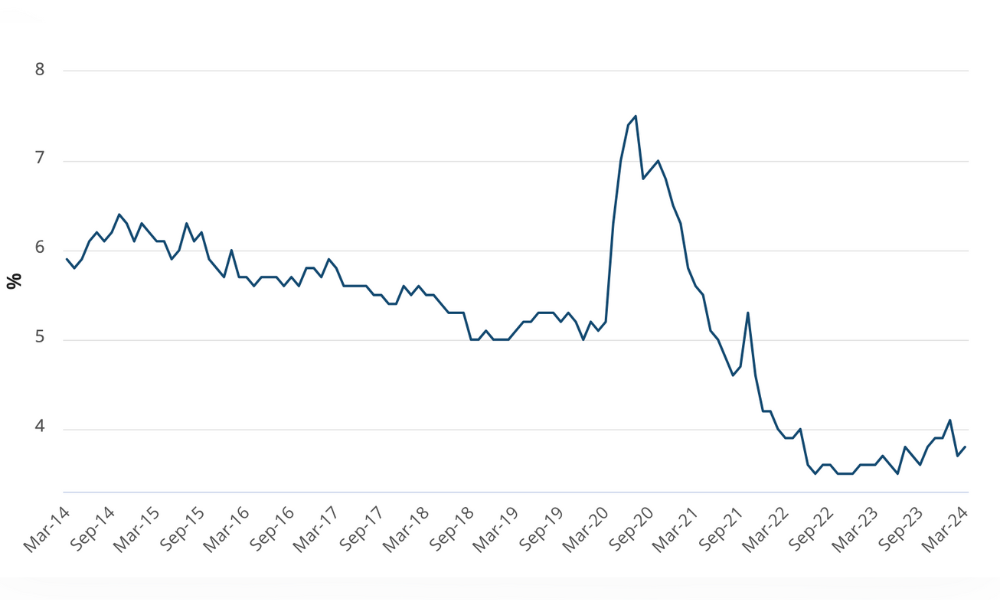ONLY 49 percent of US employees said they have trust and confidence in the job their senior managers are doing, down from 51 per cent in 2004
ONLY 49 percent of US employees said they have trust and confidence in the job their senior managers are doing, down from 51 per cent in 2004. The recent survey of 12,205 full-time US workers across all job levels and major industries revealed that just over half (53 per cent) believed that senior management makes the changes necessary for the company to stay competitive. Further efforts by senior managers were given the following ratings:
Takes steps to control costs 59%
Behaves consistently with the company’s core values 57%
Takes an active, visible role in communicating to employees 43%
All ratings showed decreases from 2004 figures as 56 per cent of highly engaged employees claimed they received communication from senior management at least monthly. In contrast, 42 per cent of low engaged employees said they received annual communication or no communication at all.
Source: Watson Wyatt
Aussies make career resolutions for 2007
THIRTY-THREE per cent of Australians are said to have thought out and written down specific work objectives for 2007. Research showed that almost 21 per cent of employees will have shared their goals for the year ahead with their boss to make them official. However, results showed that people sick of making new year career resolutions expressed that personal life is more important and they just work for the money (35 per cent), new year career resolutions are never seen through (26 per cent) and all employers are the same except for location (14 per cent).
Source: Linkme.com.au
Chief executives look to 2007
NEARLY 80 per cent of chief executives have predicted revenue increases for their businesses with 65 per cent forecasting profit growth. The survey of 242 Australian chief executives revealed the employment outlook is looking good for the next 12 months, and by this time next year 63 per cent of all companies surveyed should have employed more people. Only 5 per cent are planning to cut staff, compared to 12 per cent this time last year. Interestingly, industrial relations was listed by only 3 per cent of respondents as a key issue for 2007. The most important issue reported for chief executives this year was staff development (33 per cent), closely followed by handling the skills shortage (22 per cent).
Source: TEC (The Executive Connection)
Employers choose reward of money over holidays
EIGHTY PER CENT of employers have reported they currently offer a variable pay program to help motivate employees and drive business results. The study of more than 300 organisations showed that variable pay programs are the preferred reward method over holiday bonuses as 66 per cent of companies said they will not award holiday bonuses this year. The reasons given for either not offering a holiday bonus or discontinuing such programs were:
Of the 34 per cent of companies that will offer a holiday bonus program in 2006, 39 per cent said they will award cash, 37 per cent will provide retailer gift certificates, and 27 per cent will give employees a gift of food.
Source: Hewitt Associates
Middle managers unhappy at work
JUST 39 per cent of middle managers are really satisfied with working in their current organisations a survey of more than 1,400 middle managers in nine countries in North America, Europe and Asia found. Furthermore, one in five (20 percent) specifically stated they were dissatisfied with their current organisation. Respondents claimed the most frustrating aspects of their jobs were:
Insufficient compensation 44%
Lack of credit for a job well done 43%
Difficulty managing work-life balance 35%
Furthermore, 23 percent of respondents said they are currently looking for a job elsewhere. Of these, 25 per cent said their primary motivation is lack of prospects for advancement at their current jobs, and 22 per cent cited better conditions at another job.
Source: ICR (International Communications Research) on behalf of Accenture
Billion dollar smokos
SMOKERS ARE reported to have cost Australian business over $3.5 billion in lost time over 2006. According to the 967 respondents, 14 per cent of Australians admitted to smoking at work, while 40 per cent said they smoke up to three cigarettes a day. Each smoko was reported to take between three and five minutes by 45 per cent of respondents. However, workplaces are increasingly becoming completely smoke-free as 31 per cent of businesses with a smoke-free work environment policy have implemented a total ban throughout the premises, including the surrounding grounds. Designated smoking rooms within workplaces were still accounted for by 16 per cent.
Source: Talent2
More Aussies require better work culture
SIXTY-FOUR per cent of Australian employees have said a different work culture would help them do their job better. Of the 967 respondents surveyed, 25 per cent survey described the culture of their work as “passive aggressive”, behaviour that is typically characterised by blame-storming, procrastination and complaining. Others described their workplace as jovial, schizophrenic, hyperactive, introverted and even manic depressive. Meanwhile, more than 50 per cent of Australians said they would prefer to work in a company that encourages them to develop new skills in many different areas, move up the corporate ladder and constantly challenge them. In addition, 25 per cent of those surveyed placed the blame of a counter-productive work culture on their boss.
Source: Talent2
UK graduates do it tough
THIRTY-THREE per cent of university graduates feel they did the wrong course with the costs and related debts stopping them from buying a house, starting a family and saving for retirement six years after they graduated. A report of 876 graduates in 2000 and 2005 from the UK found 23 per cent of those who graduated in 2005 said they would choose a different course such as a scientific/technical course and 22 per cent would choose a business-based course or a professional qualification. The increase in average starting salaries between those who graduated in 2000 and 2005 is just 8 per cent with those graduating in 2005 earning a mean starting salary of £19,451 ($49,242 AUD), while 2000 graduates are beginning with a mean of only £18,016 ($45,609 AUD).
Source: Chartered Institute of Personnel and Development (CIPD)
European financial execs reap the benefits
FIFTY-TWO per cent of European organisations have no maximum bonus for executive positions. According to the survey of 1,000 employees at 33 top multinational banking and insurance companies, over 70 per cent of compensation for financial services chief executives is paid through bonuses and long-term incentives. Banking chief executive officers received median bonus payments of 121 per cent of base salary in 2006, while insurance chief executives received 101 per cent of base salary. Demand for chief risk officers was made evident as they received average salary increases of 14 per cent during 2006. Other positions that received above average salary increases included heads of:
Treasury 12%
Communications 10%
Human resources 9%
Among the survey respondents, 39 per cent reviewed their long-term incentive plans during the last 12 months, or are currently reviewing them. Insurance chief executive officers received median long-term incentives worth 210 per cent of base salary compared to 170 per cent of base salary for banking chief executives.
Source: Mercer Human Resource Consulting








